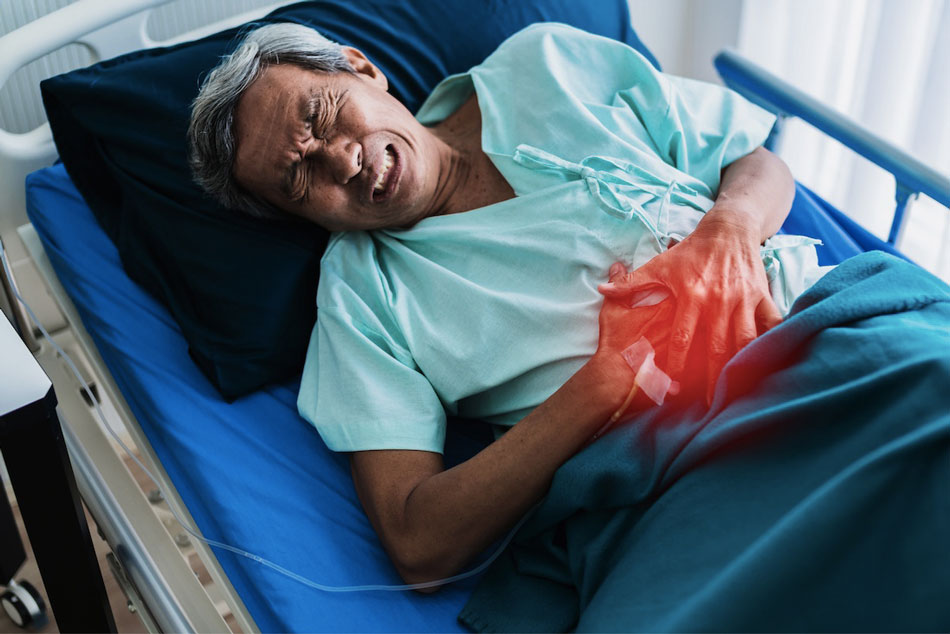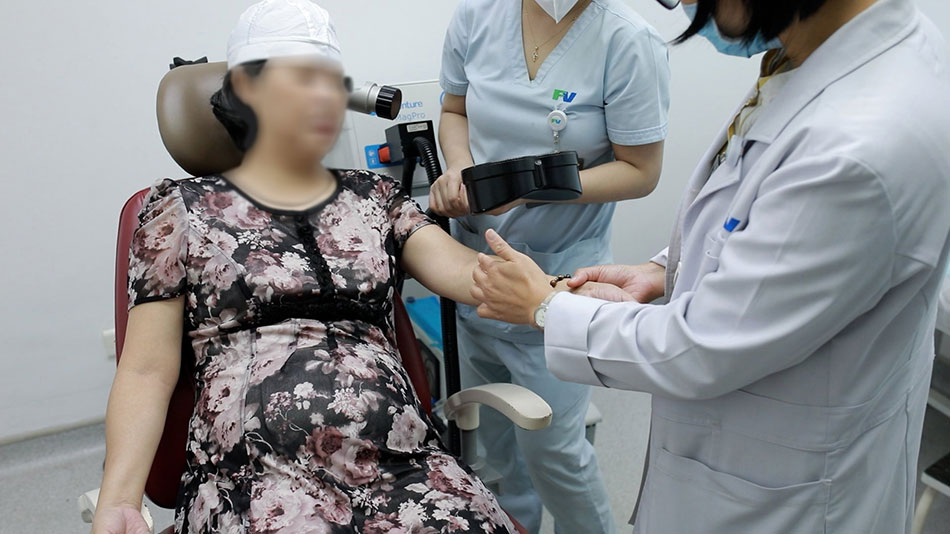“Treating cancer pain not only helps to reduce the physical suffering of patients, but improves their mental health and that of their family members. Many people experience long-term mental problems, even depression, when they see their loved ones suffering and in pain towards the end of their lives,” says Dr Nguyen Nam Binh, Pain Control Department, FV Hospital.
Cancer patients don’t need to endure persistent pain
Mr H. (60 years old) had terminal cancer and was discharged from hospital because he no longer responded to cancer treatment regimens. Due to improper pain control, Mr H. suffered from persistent and constant pain that made him lose sleep and often become irritated with his loved ones.

Many terminal cancer patients suffer from persistent pain
In mid-2021, Mr H. was brought to the Pain Control Department at FV Hospital by his relatives. After examination, Dr Nam Binh instructed Mr H. to use more morphine to support more effective pain relief. After a few days, Mr H.’s pain was reduced and he was able to sleep again, and his mental state and mood also improved. His family was also much less stressed as Mr H.’s suffering in his remaining days was vastly reduced and they could spend more precious happy moments together.
More than 70 per cent of cancer patients have pain as the disease progresses, and this rate is close to 90 per cent for those in the latter stages of cancer, as in Mr H.’s case.

Dr Nguyen Nam Binh, Pain Control Department, FV Hospital
Dr Binh shared that the biggest barrier in pain treatment for cancer patients is the assumption on behalf of patients and some doctors that if you have cancer, you have to accept pain.
Some people worry that painkillers will cause addiction or negatively impact the effectiveness of cancer treatment. As a result, many patients accept living with persistent pain, even feeling tortured in the last moments of their life.
“The World Health Organization (WHO) rejects this inappropriate perception and offers a treatment scale for pain which encompasses mild, moderate, severe and refractory pain. Pain control is needed at all stages of cancer treatment. Therefore, when experiencing pain, the patient should visit their doctor who can prescribe medication to reduce their suffering,” Dr Binh explains.
Effective pain control at all stages of cancer
Patients with cancer need to receive pain control as part of their treatment at all stages from experienced doctors with access to state-of-the-art equipment following standardised protocols. Accordingly, with mild pain, patients are assigned to use common pain relief medications in combination with anti-inflammatory and other drugs.

A cancer patient receives treatment for pain at the Pain Control Department, FV Hospital
When pain develops from moderate to severe, doctors will combine medications at a higher level to increase the effectiveness of pain relief.
Before designating any drug, dose, and method of delivery, doctors will consider the patient’s general health status, the drug’s side effects, and the living and economic conditions of the patient.
“The use of medication in the pain control treatment of cancer needs to be calculated very carefully according to the condition of each patient at each stage of treatment. It is not necessary to treat cancer pain with the use of morphine, and not every use of morphine means the patient will develop an addiction to it. At FV Hospital, many patients only use morphine for a short time. When the patient’s pain level decreases due to their response to cancer treatment, pain control doctors will consider reducing the dose, switching to a milder pain relief medication, or discontinuing use of the drug entirely,” says Dr Binh.
Finally, in cases of refractory pain—which means pain relief medications are no longer effective – the doctor will apply therapies such as nerve blocks or continuous pain medication delivery through a specially designed device, which allows patients to move and live comfortably while a fixed amount of medicine is continuously delivered under their skin. This latter option means that patients do not need to continuously pay attention to timing their doses of medication, leaving them free to pursue their normal daily routine.
FV Hospital’s Pain Control Department is staffed by qualified dedicated doctors, led by Head of Department Dr Louis Brasseur. Dr Louis has more than 40 years of experience in applying advanced methods in pain treatment and control for cancer patients, patients with chronic diseases, cases of unexplained pain, and pain due to depression.
To make an appointment for consultation and treatment at FV’s Pain Control Department, please call (028) 54113333.



